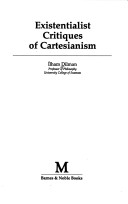This book is a discussion of Heidegger's, Sartre's and Marcel's rejection of Cartesian epistemology, the scepticism to which it leads and its objectivist conception of human existence. It compares this rejection with Wittgenstein's rejection of these conceptions of man, his relation to the knowledge of what belongs to the world in which he lives. It concentrates on the existentialist critiques of consciousness as a substance and of the self as such a substance, of each person's body as something external to which he is causally related, and of others as at best indirectly accessible to us. It discusses Sartre's positive views on these questions and the way he falls into a form of solipsism himself. It then considers Sartre's rejection of determinism and his conception of freedom as our capacity for choice. In a concluding chapter the book sketches a non-objectivist account of the self, its development, its 'bad faith', its capacity to emerge from it, and its knowledge of itself, free from the objections considered earlier. It then considers some new objections directed at its own account. Contents: Man in the World; Man's Way of Being: Existential Dualism; The Personal Dimension: Emotions and Value Judgements; Sartre and our Identity as Individuals; Mind and Body: Rejection of Cartesian Dualism; Sartre on the Self and the Other: Rejection of Cartesian Solipsism; Human Separateness and the Possibility of Communion: Marcel's Rejection of Sartrean Solipsism; Sartre: Freedom as Something to which Man is Condemned; Self, Self-Knowledge and Self-Change: A Non-Objectivist View and its Defense.
- ISBN10 0389210048
- ISBN13 9780389210047
- Publish Date 5 August 1993 (first published June 1993)
- Publish Status Active
- Publish Country US
- Publisher Rowman & Littlefield
- Imprint Barnes & Noble Books-Imports, Div of Rowman & Littlefield Pubs., Inc
- Format Hardcover
- Pages 224
- Language English
